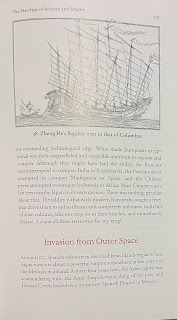I'll continue editing this blog post tomorrow. Because my online stalker has disabled the highlighting and coloring function on my blogs I can't highlight and color the whited out writing in the above link all at once. I have to highlight and color each letter at a time and this is time consuming. (I've started, however. Have a gander at the below writing. This is what I'd like the above blog post to look like when I'm done editing it (I should be done by Sunday, I'm sorry, this Sunday).
https://avalonlibrary.net/ebooks/Gregory%20Clark%20-%20A%20Farewell%20to%20Alms%20-%20A%20Brief%20Economic%20History%20of%20the%20World.pdf
https://x.com/williameijer/status/1936792866694557991
https://x.com/williameijer/status/2005677122027913582
This fitness advantage leads the quality-preferring genotypes to increase in prevalence. As this occurs, technological progress increases, as the average level of education in the population drives technological progress. This in turn increases the incentive to invest in education, creating a feedback loop between technology and education.
...
Eventually, the rate of technological progress gets high enough to induce the quantity-preferring genotypes to invest in education. When this happens, the average level of education jumps, boosting technological progress and causing the Industrial Revolution.
During this process, the population growth rate changes. Up to the time of the Industrial Revolution, population growth increases with technological progress. However, when the level of technology leaps with the Industrial Revolution, the level of education becomes so high that population growth drops dramatically. Everyone is investing more into education than raw numbers of children.
From an evolutionary perspective, the Industrial Revolution also changes the selection pressure in the model. After the Industrial Revolution, the quality-preferring genotypes invest so much into education that they have lower fertility than the quantity-preferring genotypes. They then reduce in prevalence, their fitness advantage erased.
http://jasoncollins.org/2014/09/30/the-genetic-basis-of-social-mobility/
 https://x.com/dr_duchesne/status/1787442612460228840
https://x.com/dr_duchesne/status/1787442612460228840One of the most powerful (and most disturbing) features of our evolved psychology is found in what we call the ingroup/outgroup bias (see Billig & Tajfel, 1973). This bias is, quite simply, a tendency (in fact, an incredibly strong tendency) to see others who are (psychologically) seen as in one's own group as more deserving of benefits relative to those who are seen as one some "other" group.
Further, the flip side seems to be true. People tend to think that those who are in some group other than their own (variously defined) are more deserving of adverse outcomes relative to those who are seen as being in their own group.
The early research on this topic found that eliciting ingroup/outgroup bias is as easy as the flip of a coin. Literally, if you're in a room where everyone flips a coin and you got a head, you're (on average) more likely to hold positive attitudes about others who also got a head—and are less benevolent toward those who, by chance alone, flipped a tail. Think about that.
Ingroup/outgroup reasoning seems to be so entrenched in our psychology that it pertains to groups of pretty much any and all kinds. Yankee fans think that Red Sox fans are somehow nefarious—and vice versa. People from one academic field tend to be overly skeptical of people in other fields. People who live in the U.S. often see people from their own region (e.g., the Northeast) in more benevolent terms than people who live in other regions (e.g., the South). And so forth.
From an evolutionary perspective (see Wilson, 2019), we can understand why the ingroup/outgroup bias is so deeply entrenched in our psychology. Under the ancestral conditions that surrounded human evolution, people did not live in large cities or nations. Prior to the advent of agriculture, about a mere 10,000 years ago (which is a sliver of time when thinking from an evolutionary perspective), all humans lived in small clans comprised primarily of kin as well as individuals whom people knew well.
People in other clans were often seen as competitors for various resources (space, food, etc.). Under such conditions, when small groups were competing with one another, showing a bias toward benefiting members of one's own group at a cost to members of other groups would have led to a kind of team mentality that would have helped individuals cooperate within groups at a cost to other groups—thus leading to benefits for both their own groups and, as a result, benefits to themselves and to their family and friends.
The ingroup/outgroup bias is a deeply entrenched feature of our evolved psychology. And this bias has the capacity to lead to all kinds of ugly and adverse outcomes.




















